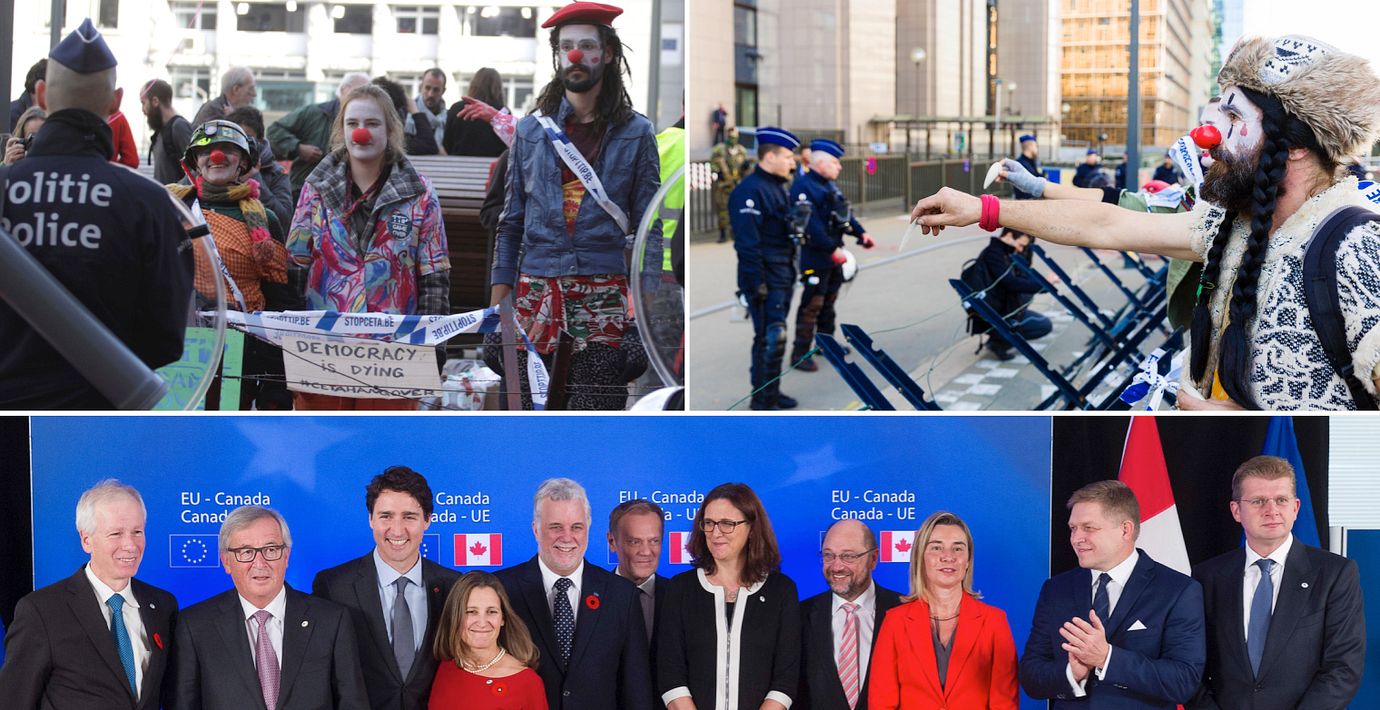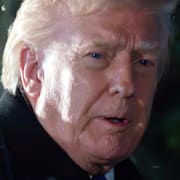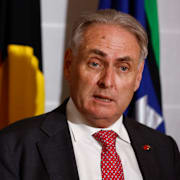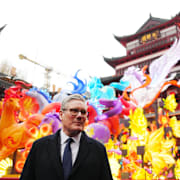
”Ceta-cirkusen ett dåligt prejudikat för framtiden”
Efter åratal av samtal och ett par veckors komedi undertecknades frihandelsavtalet Ceta mellan Kanada och EU. ”Det var ett bra resultat, men med störande konsekvenser”, skriver Bloomberg i en osignerad ledare.
Anledningen är att cirkusen kring de motspänstiga vallonerna inte ingjuter mycket hopp för ett TTIP-avtal, enligt ledaren.
”Om EU vill uppnå fler avtal liknande Ceta, var det här prejudikatet ett misstag”.
Enligt ledaren bör de inblandade regeringarna fortsätta driva igenom Ceta, TTIP och TPP. ”Men de kan inte förvänta sig att lyckas om de inte tar itu med den antiglobalistiska opinionen”.
bakgrund
Comprehensive Economic and Trade Agreement (Ceta)
Wikipedia (en)
The Comprehensive Economic and Trade Agreement (CETA) is a free free-trade agreement between Canada and the European Union. When implemented, the agreement will eliminate 98% of the tariffs between Canada and the EU.
The negotiations were concluded in August 2014. All 28 European Union member states approved CETA with Belgium being the final country to approve. Justin Trudeau, Prime Minister of Canada traveled to Brussels on 30 October 2016 to sign on behalf of Canada.
The EU claims the treaty will lead to savings of just over half a billion euros in taxes for EU exporters every year, mutual recognition in regulated professions such as architects, accountants and engineers, and easier transfers of company staff and other professionals between the EU and Canada. The European Commission claims CETA will create a more level playing field between Canada and the EU on intellectual property rights.
Critics oppose the treaty on the grounds that it will weaken European consumer rights, including those concerning food safety, and that tariffs are already very low. It has also been criticized as a boon only for big business and multinational corporations, while risking net-losses, unemployment, and environmental damage impacting individual citizens. The deal also includes a controversial investor-state dispute settlement mechanism. The agreement has prompted protests in Europe and Canada.
bakgrund
Trans-Pacific Partnership (TPP)
Wikipedia (en)
The Trans-Pacific Partnership (TPP) or Trans Pacific Partnership Agreement (TPPA) is a trade agreement among twelve of the Pacific Rim countries—notably not including China. The finalized proposal was signed on 4 February 2016 in Auckland, New Zealand, concluding seven years of negotiations. It is currently awaiting ratification to enter into force. The 30 chapters of the agreement aim to "promote economic growth; support the creation and retention of jobs; enhance innovation, productivity and competitiveness; raise living standards; reduce poverty in the signatories' countries; and promote transparency, good governance, and enhanced labor and environmental protections." The TPP contains measures to lower both non-tariff and tariff barriers to trade, and establish an investor-state dispute settlement mechanism.
The TPP began as an expansion of the Trans-Pacific Strategic Economic Partnership Agreement (TPSEP or P4) signed by Brunei, Chile, New Zealand, and Singapore in 2005. Beginning in 2008, additional countries joined the discussion for a broader agreement: Australia, Canada, Japan, Malaysia, Mexico, Peru, the United States, and Vietnam, bringing the total number of countries participating in the negotiations to twelve. Current trade agreements between participating countries, such as the North American Free Trade Agreement, will be reduced to those provisions that do not conflict with the TPP or provide greater trade liberalization than the TPP. The United States government considers the TPP a companion agreement to the proposed Transatlantic Trade and Investment Partnership (TTIP), a broadly similar agreement between the U.S. and the European Union.
Participating nations aimed at completing negotiations in 2012, but the process was prolonged by disagreements over contentious issues, including agriculture, intellectual property, and services and investments. They finally reached agreement on 5 October 2015. Implementing the TPP has been one of the trade agenda goals of the Obama administration in the U.S. On 5 October 2015, Canadian Prime Minister Stephen Harper stated he expected "signatures on the finalized text and deal early in the new year, and ratification over the next two years." A version of the treaty text "Subject to Legal Review (...) for Accuracy, Clarity and Consistency" was made public on 5 November 2015, the same day President Obama notified Congress he intended to sign it.
bakgrund
Transatlantic Trade and Investment Partnership (TTIP)
Wikipedia (en)
The Transatlantic Trade and Investment Partnership (TTIP) is a proposed trade agreement between the European Union and the United States, with the aim of promoting trade and multilateral economic growth. The American government considers the TTIP a companion agreement to the Trans-Pacific Partnership (TPP). The agreement is under ongoing negotiations and its main three broad areas are: market access; specific regulation; and broader rules and principles and modes of co-operation. The negotiations were planned to be finalized by the end of 2014, but will not be finished until 2019 or 2020, according to economist Hosuk Lee-Makiyama.
The reports on the ongoing negotiations and the contents of the negotiated TTIP proposals are classified from the public, and can be accessed only by authorised persons. Multiple leaks of proposed TTIP contents into the public caused controversy.
The European Commission says that the TTIP would boost the EU's economy by €120 billion, the US economy by €90 billion and the rest of the world by €100 billion. According to Anu Bradford, law professor at Columbia Law School, and Thomas J. Bollyky of the Council on Foreign Relations, TTIP aims to "liberalise one-third of global trade" and could create millions of new jobs. However, a Guardian article by Dean Baker of the US thinktank Center for Economic and Policy Research argued that the economic benefits per household would be relatively small, and according to a European Parliament report, the effects range from job gains to job losses, depending on the economic models and assumptions used for predictions.
The agreement has been criticized and opposed by some unions, charities, NGOs and environmentalists, particularly in Europe. The Independent describes common criticisms of TTIP as "reducing the regulatory barriers to trade for big business, things like food safety law, environmental legislation, banking regulations and the sovereign powers of individual nations", or more critically as an "assault on European and US societies by transnational corporations". The Guardian noted the criticism of TTIP's "undemocratic nature of the closed-door talks", "influence of powerful lobbyists", TTIP's potential ability to "undermine the democratic authority of local government", and described it as "the most controversial trade deal the EU has ever negotiated". An EU direct democracy mechanism, the European Citizens' Initiative, which enables EU citizens to call directly on the European Commission to propose a legal act, acquired over 3.2 million signatures against TTIP and CETA within a year.
Tidigare:
bakgrund
Ceta
Wikipedia (sv)
Comprehensive Economic and Trade Agreement (CETA) är ett föreslaget handelsavtal mellan Kanada och EU. Förhandlingarna slutfördes i augusti 2014, men avtalet behöver godkännas av Ministerrådet, EU-parlamentet och alla EU:s medlemsländer för att bli giltigt inom hela EU. Om det skulle antas fullt ut så skulle 98 procent av tarifferna mellan EU och Kanada avvecklas. Likt andra stora handelsavtal har även Ceta blivit hett omdebatterat och kritiserat, inte minst av vänsterdebattörer.
bakgrund
TTIP
Wikipedia (sv)
Transatlantiskt partnerskap för handel och investeringar, förkortat TTIP (engelska: Transatlantic Trade and Investment Partnership eller Transatlantic Free Trade Area, förkortat TAFTA), är ett planerat frihandelsavtal mellan Europeiska unionen (EU) och USA med syftet att förenkla handel dem emellan genom att ta bort olika handelshinder. Om handelsavtalet går igenom skulle det resultera i världens största regionala frihandelszon.
I juni 2013 startade förhandlingarna och den första förhandlingsrundan hölls i juli. Ytterligare rundor hålls därefter var femte vecka. Avtalet förväntades från början vara färdigförhandlat i slutet av 2014, men våren 2015 kom rapporter om att det kunde dröja ända till 2017. Från EU:s sida hålls förhandlingarna av Europeiska kommissionen representerad av handelskommissionären Cecilia Malmström. Europeiska kommissionen förhandlar på ett mandat fastställt av Europeiska rådet (EU-ländernas stats- eller regeringschefer). Europaparlamentet och EU-ländernas parlament och vissa delstatsparlament kommer vid ett färdigförhandlat avtal behöva ratificera avtalet för att det ska börja gälla.
Omni är politiskt obundna och oberoende. Vi strävar efter att ge fler perspektiv på nyheterna. Har du frågor eller synpunkter kring vår rapportering? Kontakta redaktionen



